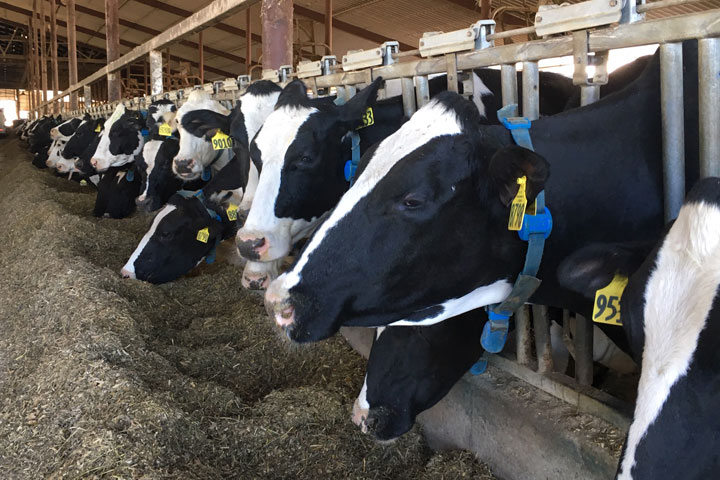PLYMOUTH, Wis. — There’s no question that dairy is Wisconsin’s most famous industry.

In the town of Plymouth, a giant statue of a Holstein stands in the middle of the “cheese capital of the world.” An astonishing 15 per cent of all the cheese in America passes through this part of Wisconsin’s Dairyland.
But Plymouth has a problem: the product at the centre of the economy is under assault as a result of President Trump’s trade wars.
The uncertainty starts on dairy farms, like the one belonging to Josh Goeser.
He says farmers were initially encouraged when Trump promised to stand up for them and win access to Canada’s protected dairy industry as part of a renegotiated NAFTA, but then reality set in.

“It was good that he wanted fair deals and it was bad about how he approached it,” Goeser said.
That’s because Trump didn’t just pick one trade fight, he picked several at the same time.
When the U.S. added tariffs to imported steel and aluminum, Canada, Mexico, China and the European Union fought back with their own reciprocal tariffs.
Suddenly Wisconsin found itself at the centre of an international trade war.
Those foreign tariffs were targeted to send a message; Wisconsin is home to Republican speaker of the house Paul Ryan, and the state helped propel Trump to the White House.
The tariffs took direct aim at Wisconsin-made goods from cheese to milk products to Harley Davidson motorcycles.

Get breaking National news
Farmers like Goeser saw the price of milk plummet almost overnight.
“We had to cut people,” he said. “And we had to watch out and make sure we’re not over-budgeting or spending money on stuff we didn’t need.”
All of the milk from Goeser Dairy is bought by another Plymouth company: Sartori Cheese.
Sartori has been hit hard by Mexico’s tariffs on imported cheese.
“Until those tariffs are alleviated we’re in a much harder position,” Blair Wilson, Sartori’s vice-president of marketing and global markets, said.
The problem is that in the cheese business, there are no quick turnarounds.
Aged cheese has to be produced months in advance. So Sartori has been trying to sell cheese to Mexico that it made long before the tariffs kicked in. In the process, they’ve had to eat a 25 per cent cost increase themselves, wary of turning off consumers if they were to pass along a price hike.
WATCH: What a trade war is and how tariffs work
They’ve also kept buying the same amount of milk and for now, they’re still producing just as much cheese.
“We really just need to understand what the landscape is going to look like,” Wilson explained. “Uncertainty is very difficult in a business like this.”
Asked what happens if the tariffs aren’t lifted soon, Wilson responded: “We’ll need to make more dramatic decisions.”
It seems ironic that the very people and industries Trump promised to help have been hurt by his policies, but the pain isn’t limited to the dairy sector.
In a suburb of Madison, there’s trouble brewing for Wisconsin’s second-most-famous export.
Octopi Brewing is a rapidly growing craft brewery.
As a canning line whirred away, owner Isaac Showaki explained that the cost of every can has gone up by nearly 25 per cent.
“We’ve had four price increases this year,” he said. “We used to get a two to three per cent annual increase.”
The reason, according to his suppliers, is Trump’s tariffs on imported aluminum.
The impact has been twofold. Consumers have seen the cost of a six-pack of beer rise by as much as $2, while Showaki estimates his business has lost nearly $300,000 to higher costs.
“We could have easily hired six more people, given raises, we had a big plan to start a big 401K, so all that stuff had to be pushed another year because of price increases,” he explained.
The struggles of Wisconsin’s prominent industries are in stark contrast to the health of the overall economy.
The unemployment rate in the state hovers below three per cent, and many businesses face a labour shortage.
That means that trade may not be top of mind for most voters or politicians during the midterm elections, even as tales of economic woe become more commonplace.
“It is complicated both for candidates and voters to wade through,” Barry Burden, a political science professor at the University of Wisconsin, Madison, said. “It’s finding a middle ground that says I understand the concerns of people in those industries who export but also saying I see the value in playing hardball with other countries.”
It’s complicated for the industries at the centre of Trump’s trade war, too.
Farmer Josh Goeser says it’s tough to talk politics with his friends, given the current climate.
Standing among his 1,100 head of dairy cattle, he admits “we try not to talk politics because we don’t want to frustrate each other.”




















Comments
Want to discuss? Please read our Commenting Policy first.